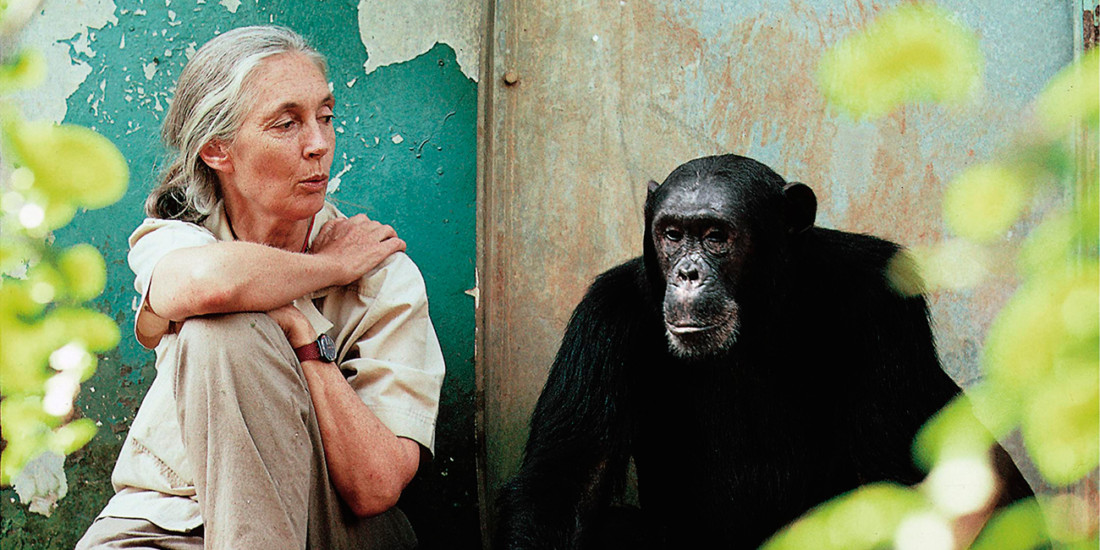Dr Jane Goodall, primatologist
Spend a little bit of time each day thinking about the consequences of the choices you make ...
Dr Jane Goodall, the world’s leading authority on chimpanzees, indefatigable conservationist and UN Messenger of Peace, needs no introduction. Speaking with the sharp 80-year-old, it’s easy to imagine the gutsy young woman in her 20s who stepped boldly into the African bush in the 1960s to learn more about our closest living relatives and our connection to them. Jane was the first to argue that chimpanzees possessed unique personalities and were meat eaters capable of using and making tools, consequentially rattling our perceptions and strengthening the link between man and animal. Since stepping back on British soil, Jane has worked tirelessly to campaign for the environment and wildlife, shedding light on topics like climate change, the effects of GMO food production and habitat destruction. The primatologist, ethologist and anthropologist enters her eighth decade this year and has decided to celebrate with a very special three-date tour of Australia. Following live shows in Sydney and Melbourne, the global icon will bring her endearing sense of humour and charm to Australia Zoo alongside host Ray Martin this Sunday June 8. The Weekend Edition was fortunate enough to chat with the softly spoken visionary as she rested in her Sydney hotel before her first tour appearance last week.
What were you like as a child? We heard a very cute story about you trying to take a bunch of earthworms to bed with you …
Not ‘trying’, I did! I was 18 months old and my mother found them in bed, and when she told me they’d die without the earth, I cried and we took them back into the garden. And then when I was four, I disappeared. My whole family was looking for me – apparently I was gone for four-and-a-half hours – and I’d been hiding in the hen house because I couldn’t understand where an egg came out of a hen.
Did you eventually work it out?
I saw it! But if you know a four year old and you imagine the patience that required, it’s quite amazing, isn’t it?
So you always dreamt of working with animals then, even as a child?
Well yes, I always loved animals. And when I was ten, I decided I had to go to Africa and live with animals and write books about them.
You’ve achieved some incredible feats over the past eight decades; what new goals have you set for yourself for the coming years?
Carrying on with what I’m doing. It’s just trying to get a critical mass of young people to understand first that if they work together they really can make a difference, and second, that we need money to live and things go wrong when we live for money – that’s the bottom line that counts.
Looking back over your 80 years on earth, what are you most proud of, in terms of career or simply in life?
Well, I think two things. One, helping people to understand that we’re part of – and not separated from – the animal kingdom, and that we’re not the only beings with personalities, minds and emotions. And secondly, starting the youth program Roots & Shoots, which is now in 136 countries and has about 150,000 active groups. It’s pretty stunning – a group can be a whole school, and it’s pre-school through to university. That’s quite amazing.
You developed personal connections with many of the chimps you studied, including Mike, Olly, Fifi and the forerunner David Greybeard. Did you have a favourite?
David. Definitely David Greybeard!
What did you love about him?
Well he was the first one to lose his fear, he was a very gentle chimpanzee. He wasn’t high ranking, but he provided comfort to the top-ranking male, who always looked to him for reassurance if things went wrong. And when the young ones got into trouble, they often ran to David. He also demonstrated tool using and tool making, and the fact that chimps sometimes eat meat, so he was very special.
Your research led to many important findings about chimps, but which discovery did you personally find the most interesting?
I think it’s a conglomeration, basically how like us chimpanzees are, in so many different ways: biological ways, behavioural ways – they have a dark side like we have, but they’re also capable of love and compassion and altruism. They can live to be more than 60 years old, every individual is different, family case histories are all different, and we’re still learning new things about them. They have different personalities and the same emotions as we do. There isn’t one single thing I can pull out – except for tool using and tool making, that I can pull out simply because that’s what brought National Geographic in to provide proper funding!
If you could convey one key message about conservation to the public, what would it be?
Spend a little bit of time each day thinking about the consequences of the choices you make – what you buy: where did it come from, how was it made, did it harm the environment, did it cause suffering to other animals or child slave labour, could you have bought it closer to home and used up fewer miles, and perhaps most important of all, do you actually need what you’re buying?
You’ve seen the population of chimpanzees diminish significantly over the years, but what gives you hope for the future?
The young people. The fact that nature is resilient. That where we had bare hills around Gombe because we involved the local people and improved their lives, they have turned around and helped us by allowing the vegetation to grow back on the steep hills. A: it gives the chimps more forest, a necessary good for their long-term survival, and B: it protects the water shed and the water supply of the village. So it’s a question of not either chimps and environment versus people, it’s a combination of helping both. We need the forests.
You’ll be appearing at Australia Zoo on the Sunshine Coast this Sunday June 8, what can Queenslanders expect from the show?
At the Australia Zoo show, the audience can expect to hear about chimpanzees, the problems of chimpanzees and the problems faced by the environment, also what they can do to help, and about our youth program Roots & Shoots.
What’s your personal definition of success?
I suppose achieving what you set out to do.
What’s your idea of complete happiness?
Well I’ve got different ideas of complete happiness. But one is being by myself out in a forest, completely happy. Another is walking with a dog in some nice place. And three is sitting around preferably a fire, but not necessarily, and drinking red wine with friends and telling stories.
Speaking of dogs, it sounds like your childhood pooch Rusty taught you a few life lessons …
Yes, he did! He taught me that animals have personalities and minds that can work things out and emotions. So when the University of Cambridge professors told me I couldn’t talk about those things regarding the chimps, I knew they were wrong.
It wasn’t just living animals you were attached to, you also fell in love with a toy chimp named Jubilee at a very young age. Do you still have him at home?
Yes, I do! He’s very delicate … after all, he’s 78 years old.
How would you describe yourself?
I don’t know, other people have to describe me … I’m obstinate, I don’t give in easily, I’m patient and I hope I’m kind.
What words of wisdom would you like to leave with our readers?
Don’t forget that every day you, reader, make a difference. And although you may feel that the small choices you make can’t actually make a difference, cumulatively, as more and more people begin to understand that collectively we can make a difference, the difference will get bigger and bigger.
Image via Jane Goodall Institute.

